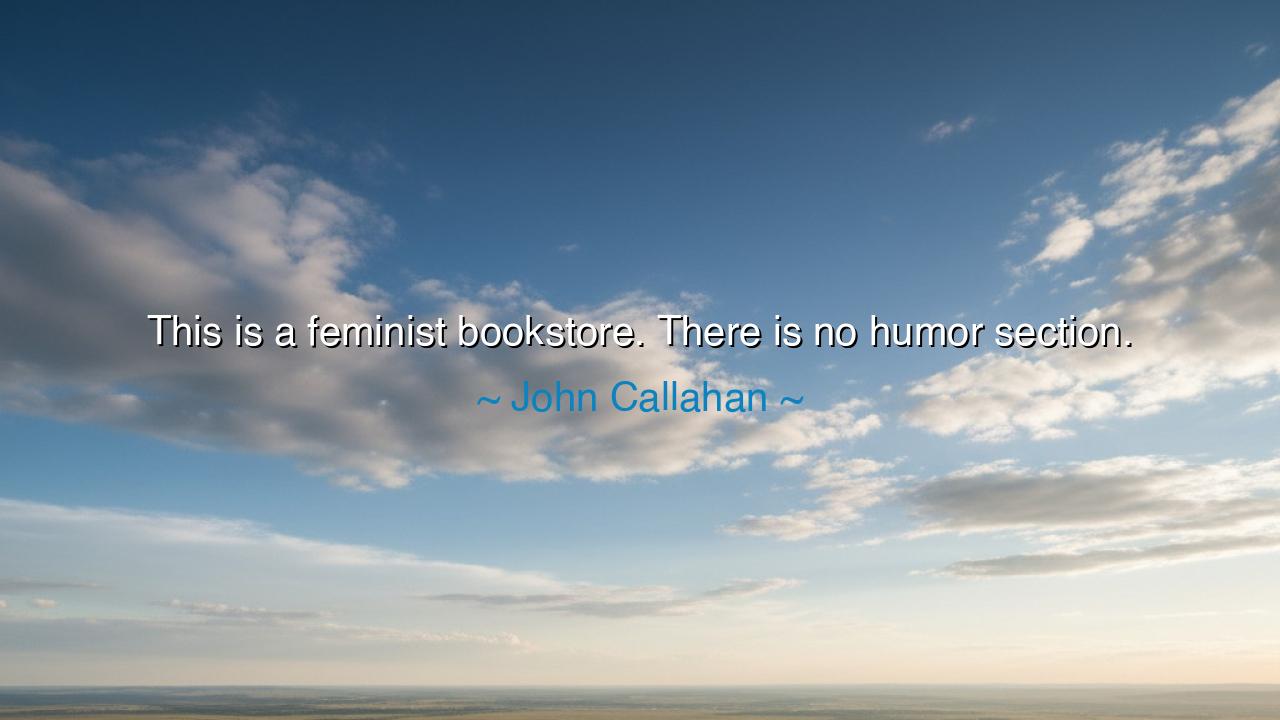
This is a feminist bookstore. There is no humor section.






In the words of John Callahan, the sharp-witted and often controversial cartoonist, there lies a statement wrapped in irony and layered with meaning: “This is a feminist bookstore. There is no humor section.” At first glance, the saying seems to mock; yet beneath its laughter lies a reflection of truth — a mirror turned upon society’s uneasy balance between conviction and levity. To those who hear only the jest, it is mere satire. But to those who listen with the ear of the soul, it is a parable on the tension between seriousness and joy, between the need for justice and the healing power of laughter.
Callahan was a man who lived amid contradiction — a paralyzed artist who used dark humor to confront his suffering, a provocateur who wielded jokes like arrows aimed at hypocrisy. His words, though spoken in jest, often carried the weight of philosophical truth. When he said, “There is no humor section,” he was not merely poking fun at feminism or bookstores, but exposing a universal temptation: the human tendency to guard ideals so fiercely that we forget to laugh, to breathe, to be kind. For every movement of reform, every age of awakening, risks becoming so solemn in its mission that it loses touch with the lightness of the human heart.
Think of the tale of Diogenes, the ancient Greek philosopher who mocked the pomp of his age with laughter rather than lectures. When Alexander the Great came to visit him and offered to grant him any wish, Diogenes merely replied, “Yes, stand out of my sunlight.” His humor cut deeper than any treatise, reminding kings and citizens alike that truth, when spoken with laughter, can pierce the armor of pride. So too did Callahan use humor as the philosopher’s torch — not to belittle, but to illuminate, to provoke reflection without venom.
In the feminist bookstore, Callahan’s imagined line becomes a symbol of what happens when ideals lose their mirth. For humor, rightly wielded, is not the enemy of seriousness but its companion. It prevents righteousness from curdling into self-righteousness, and conviction from hardening into cruelty. Even the most noble cause — be it the pursuit of equality, freedom, or wisdom — must remember the laughter of humanity, lest it forget what it fights for. Laughter reminds us that the struggle for justice is not against joy, but for it.
Yet there is another layer to Callahan’s saying, darker and tenderer. The absence of humor can also signify pain — the exhaustion of those who have suffered mockery and scorn. For in truth, many who have fought for dignity have been the targets of ridicule, and thus they build walls against laughter, mistaking it for derision. In this sense, the bookstore without humor is not arrogance but defense — the silence of the wounded who have not yet learned to laugh again. To understand this is to see that Callahan’s irony cuts both ways: he mocks not to wound, but to ask that we all reclaim the sacred balance between earnestness and grace.
From this reflection, let the listener learn: truth and humor must walk hand in hand. A world without laughter becomes brittle; a world of laughter without conscience becomes cruel. The wise know when to jest and when to weep, when to strike with words and when to soothe with silence. Laughter is not the absence of seriousness, but its relief — the breath that keeps the fire from consuming the house.
So, take this lesson and bind it to your days: fight for what is right, but never lose your laughter. Defend your beliefs, but not at the expense of your humanity. Whether you stand in a bookstore, a court, or the marketplace of ideas, let your words be fierce yet kind, bold yet smiling. For laughter, when born of truth, is the song of freedom — and in that song lies the very spirit of understanding that unites the heart of justice with the heart of joy.






AAdministratorAdministrator
Welcome, honored guests. Please leave a comment, we will respond soon